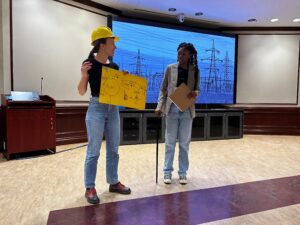
“Engineering is inherently creative, and theatre is another lens through which to explore that creativity,” says Professor Deborah Tihanyi (ISTEP).
Since 2008, Tihanyi has led TEP320 – Representing Science on Stage, exploring the intersection of science and theatre in an engineering context.
Professor Tihanyi brings a unique skillset and perspective to the Faculty of Engineering, having earned her BA (Hons.) in Theatre, and her MA and PhD in Drama.
“I began teaching in engineering in 2001, but I was still working in theatre as a professional dramaturge by night,” says Tihanyi. “The work of a dramaturge is about facilitating voice and helping playwrights develop new plays. I realized early on that I was doing the same work with engineering students, helping them to voice their engineering practice, through oral, visual, and written media.”
“Having seen what the creative process looks like on both sides, it became clear that there was value in exploring the overlap between the two. That is how Representing Science on Stage took shape.”
Tihanyi teaches her students to see how creativity is harnessed in engineering and theatre specifically, as well as in the humanities more broadly. The course is taught through a mix of seminar classes, where students study play texts and learn about theatre practice, and studio classes, where students engage in performance activities.
“The medium through which you tell a story fundamentally influences the message. I try to show this potential to my students. It’s something I hope they can carry with them as they communicate what they do to the broader public,” says Tihanyi.
Throughout the term, students work in teams, honing their communication skills through performance and devising their own original works.
“Students come to the class with different areas of engineering expertise. This year, students chose a wicked engineering problem to explore, first through their disciplinary lens and then through the lens of performance,” says Tihanyi.
Topics explored ranged from over reliance on fossil fuels to challenges of public policy impeding infrastructure improvements.
Liora Grushcow (EngSci, Year 4 + PEY), a Fall 2024 TEP320 student, shares her experience in the course.
“Creating an emotional connection in my technical work is a challenge I have thought a lot about, and this course really opened my eyes to the potential of art to communicate something real about my work,” says Grushcow.
“I was surprised how much information could be communicated about engineering topics using art. I didn’t realize how much could be gained through creative representations.”
Students also got to experience engineering storytelling first-hand through The Master Plan, an original play written by Canadian Playwright Michael Healey. The play tells the story of Google’s failed attempt at creating their proposed ‘Smart City’ along the Toronto waterfront.
“TEP320 reaffirmed my belief that engineering work is interesting, but more importantly, that it can be communicated to almost anybody in a way they would care about. It’s worth the time you’ll put in.”
– Liora Grushcow
TEP320 – Representing Science on Stage is one of ISTEP’s TEP engineering course offerings. Find more details about all the 2025-26 TEP undergraduate courses at uofteng.ca/istep-ugrad.